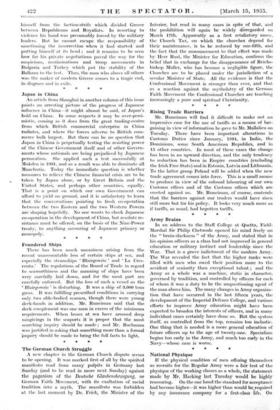Army Brains In an address to the Staff College at
Quetta, Field- Marshal Sir Philip Chetwode opened his mind freely on the " brain-slackness " of the Army, and stated that in his opinion officers as a class had not improved' in general education or military instinct and leadership since the War. That is a grave indictment of the modern Army. The War revealed the fact that the higher ranks were filled with men who owed their position more to the accident of seniority than exceptional talent,; and the Army as a whole was a machine, static in character, governed by tradition, and controlled by officers for each of whom it was a duty to be the unquestioning agent of the man above him. The many changes in Army organiza- tion that have occurred in the last fifteen years, the development of the Imperial Defence College, and various efforts to improve Army education might have been expected to broaden the interests of officers, and in many individual cases certainly have done so. But the system itself, as controlled from the top, remains too inelastic. One thing that is needed is a more general education of future officers up to the age of twenty-one. Specialism begins too early in the Army, and much too early in the Navy—whose case is worse.










































 Previous page
Previous page